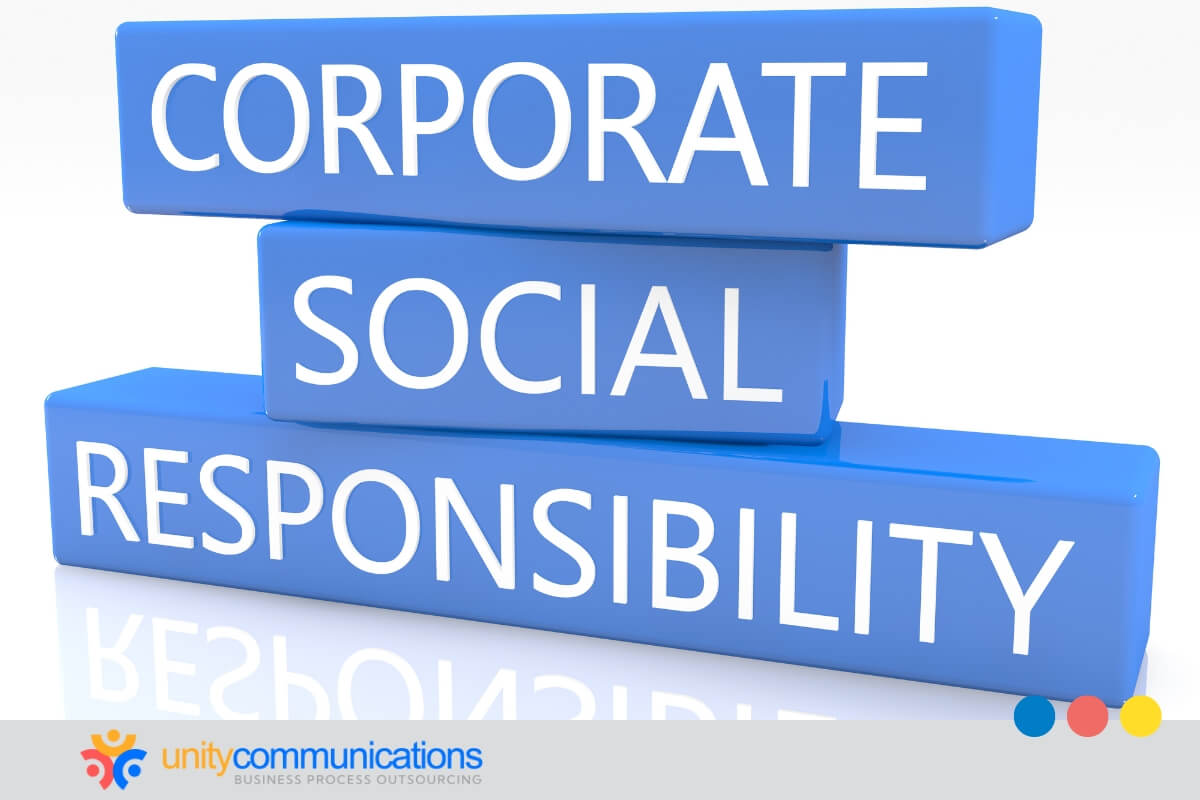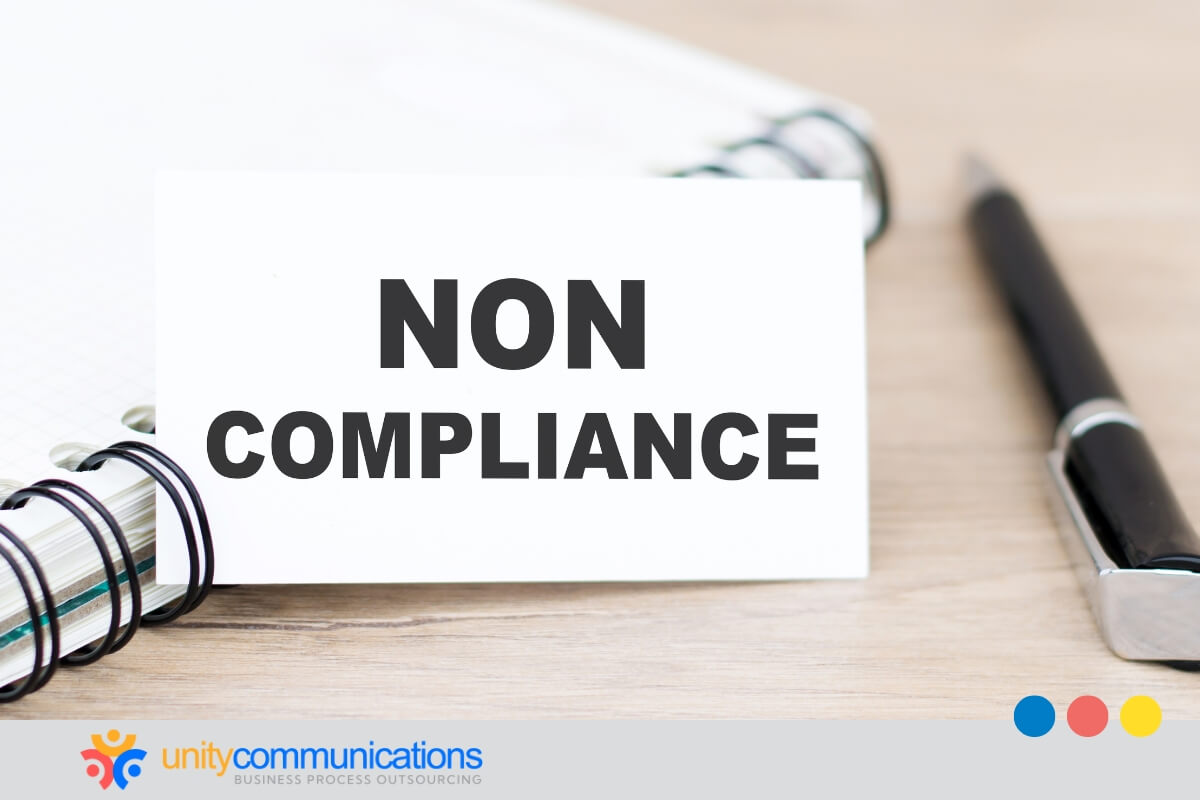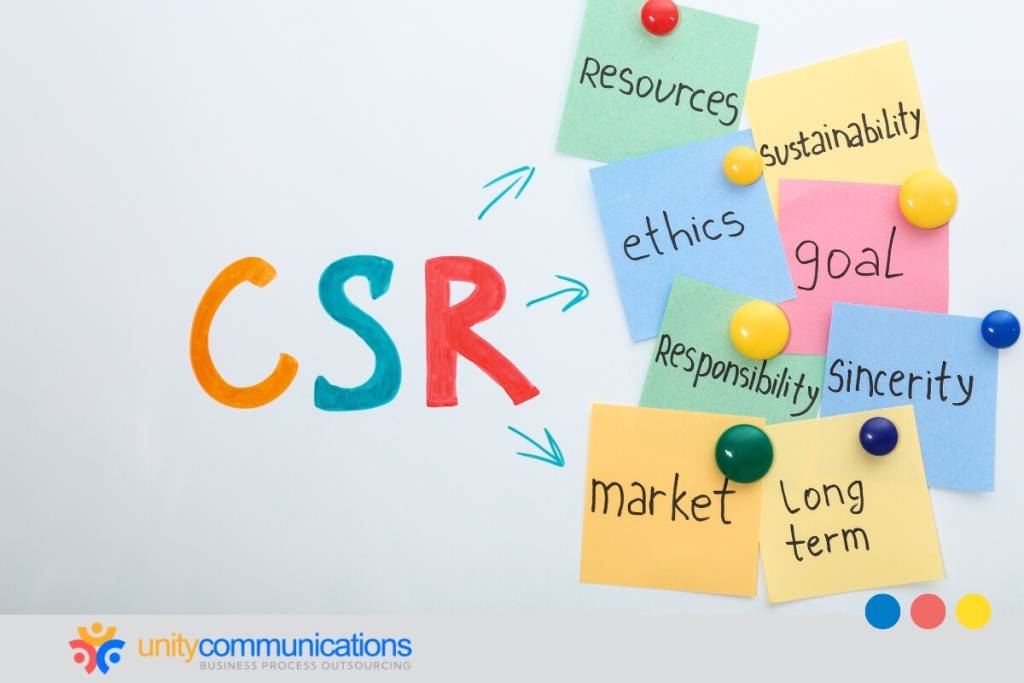Table of Contents
Corporate social responsibility (CSR) is no longer optional—it is a vital component of how businesses operate, especially when outsourcing. Without clear guidelines and oversight when business process outsourcing, you risk reputational damage, legal issues, and ethical lapses across the supply chain.
This article outlines key CSR risks in outsourced projects and shares proven best practices to help you uphold your company’s social and environmental responsibilities with third-party vendors.
Importance of CSR initiatives in outsourcing

What is BPO, and why does CSR matter in outsourcing? Business process outsourcing is the delegation of specific business processes to third-party service providers. Standard functions of BPO include customer support, human resources, finance and accounting, IT services, and supply chain management.
CSR in outsourcing plays a vital role in protecting brand integrity, as unethical practices of third-party vendors can directly affect your reputation and customer trust. It also ensures compliance with legal and regulatory requirements, reducing the risk of fines, lawsuits, and operational disruptions.
Understanding the role of CSR in outsourcing is a crucial first step. However, you must also identify and manage potential risks to apply it effectively.
The following section outlines the challenges in CSR compliance and best practices for addressing them across outsourced projects.
Key risks and best practices in CSR for outsourced projects

Let us now focus on the critical risks in CSR compliance during outsourcing and the best practices to overcome these risks.
1. Lack of transparency in supply chains
A lack of visibility into your outsourced supply chains can lead to unethical practices, such as labor violations or environmental harm. Transparency ensures that every link in your supply chain aligns with your company’s CSR values and standards.
Best practices that promote supply chain transparency include:
- Conduct thorough due diligence before selecting outsourcing partners.
- Require regular reporting and vendor audits on labor, environmental, and ethical practices.
- Implement traceability systems to track materials and processes throughout the supply chain.
- Foster open communication and collaboration with your outsourcing partners to encourage accountability.
- Use third-party certifications to validate compliance with CSR standards.
A lack of supply chain visibility can result in labor violations or environmental harm. Promote transparency with due diligence, regular audits, traceability systems, open communication, and third-party certifications.
2. Inconsistent labor standards and workers’ rights violations
Another CSR risk for outsourced projects is inconsistent labor standards. Countries can implement their labor laws differently. Some might be strictly regulated and actively enforced. Others might have weaker oversight, limited resources, or inconsistent enforcement, increasing workers’ rights violations.
How do you practice fair treatment and safe working conditions when outsourcing? Consider these strategies:
- Establish a code of conduct that outlines labor standards and workers’ rights expectations for all outsourcing partners.
- Perform regular social audits to assess working conditions and compliance with labor laws.
- Partner with vendors who are certified by recognized labor rights organizations.
- Provide training and support to your outsourcing partners on ethical labor practices.
- Create accessible channels for employees to report grievances confidentially and address them promptly.
Different countries enforce labor laws with varying levels of rigor, leading to potential rights violations. Combat this by creating a code of conduct, conducting audits, partnering with certified vendors, offering training, and setting up safe grievance channels.
3. Environmental non-compliance and unsustainable practices
With 46% of consumers now buying sustainable products, you need to prioritize environmental responsibility.
However, you could lose this opportunity if your third-party provider fails to follow sustainable practices or comply with ecological regulations. How do you align outsourced projects with sustainability goals and minimize negative environmental impacts?
Adopting sustainable practices includes the following:
- Set clear environmental performance standards for all outsourcing partners.
- Conduct regular environmental audits to monitor compliance.
- Prioritize working with vendors with recognized environmental certifications, such as ISO 14001.
- Encourage using eco-friendly materials, energy-efficient processes, and waste reduction initiatives.
- Collaborate with partners to implement sustainable supply chain strategies.
Environmental lapses by vendors can alienate eco-conscious consumers and invite penalties. Set performance standards, audit regularly, use eco-certified vendors, and collaborate on sustainable supply chain strategies.
4. Weak governance and ethical oversight
Poor governance and ethical oversight can expose your outsourced projects to corruption, fraud, and unethical business practices.
Minimize this CSR risk for outsourced projects with these best practices:
- Develop a framework that outlines ethical expectations for all outsourcing partners.
- Include anti-corruption and anti-bribery clauses in your contracts and agreements.
- Conduct regular compliance audits and risk assessments focused on ethical practices.
- Appoint dedicated teams or third-party monitors to oversee governance and ethics in outsourced operations.
- Provide ethics training for your internal teams and your outsourcing partners.
Poor governance opens the door to corruption and fraud. Mitigate this by embedding ethics into your vendor framework, conducting compliance audits, appointing ethics monitors, and providing training.
5. Data privacy and security breaches
Outsourcing often involves sharing sensitive data with third-party vendors, increasing the risk of privacy violations and security breaches. Protecting your customers’ and company’s confidential information should be a top priority when managing outsourced projects to avoid legal liabilities, penalties, and reputational damage.
Best practices to preserve data privacy and security include:
- Partner with vendors that comply with industry regulations and international laws, such as the General Data Protection Regulation (GDPR) or the Health Insurance Portability and Accountability Act of 1996 (HIPAA).
- Include strict data privacy and security clauses in your outsourcing contracts.
- Implement robust access controls and encryption protocols to safeguard sensitive data.
- Conduct regular security audits and vulnerability assessments on your vendors’ systems.
- Provide ongoing data privacy and cybersecurity training to internal teams and outsourcing partners.
Outsourcing sensitive data introduces cybersecurity risks. Protect it by working with GDPR/HIPAA-compliant vendors, tightening contract terms, using encryption, auditing regularly, and offering privacy training.
6. Cultural misalignment and communication gaps
Outsourcing can sometimes lead to cultural misunderstandings and communication barriers that affect collaboration, productivity, and project outcomes. For example, differences in time zones, work styles, communication norms, or language proficiency can cause delays, misaligned expectations, or confusion in task execution.
Avoid this CSR risk for outsourced projects by:
- Provide cross-cultural training for your team and outsourcing partners to promote mutual understanding.
- Establish clear communication protocols, including preferred channels, meeting schedules, and reporting formats.
- Use collaboration tools that support real-time communication and document sharing to minimize misunderstandings.
- Assign dedicated managers to facilitate communication and address cultural issues.
- Build an inclusive culture.
Cultural barriers and time zones can disrupt collaboration. Provide cross-cultural training, standardize communication protocols, use real-time collaboration tools, and assign project liaisons.
7. Reputational damage and stakeholder distrust
About 77% of consumers would buy from socially responsible businesses, underscoring the importance of CSR in outsourced projects. Its failure can quickly lead to reputational damage and erode stakeholder trust.
Protecting your brand’s integrity requires proactive approaches to managing risks and consistently demonstrating accountability in outsourcing partnerships. Examples include:
- Create crisis management plans to address issues swiftly and effectively.
- Engage regularly with stakeholders to communicate your CSR commitments and progress.
- Develop a vendor scorecard system to evaluate their CSR performance, ethical conduct, and responsiveness alongside traditional key performance indicators (KPIs).
- Host joint CSR planning sessions to align on shared values, social impact goals, and accountability measures.
- Use real-time monitoring tools to track compliance with CSR commitments, especially in high-risk regions or industries.
CSR failures can destroy brand trust. Stay ahead with crisis plans, stakeholder engagement, vendor CSR scorecards, joint planning sessions, and real-time monitoring tools.
Future trends in CSR for outsourcing practices

CSR in outsourcing evolves as the global demand for sustainable and ethical businesses rises. One trend is organizing community programs, which studies show can increase customer loyalty by 23%.
Other emerging practices include:
- Increased use of technology, such as blockchain, for better supply chain transparency
- Growing emphasis on supplier diversity and inclusion to promote equitable economic opportunities
- Enhanced focus on climate action and carbon footprint reduction within outsourced operations
- Stricter regulatory frameworks that include detailed CSR reporting and third-party verification
- Integration of social impact initiatives, such as local hiring and workforce development, into outsourcing strategies
Embracing these future trends minimizes the CSR risks for outsourced projects, strengthens branding, improves competitive advantage, and fosters ethical and resilient outsourcing relationships.
The bottom line
CSR compliance in outsourcing protects your brand, upholds ethical practices, and meets legal requirements across your supply chain. Addressing common challenges such as lack of transparency, labor violations, and environmental non-compliance can also build responsible and sustainable outsourcing relationships.
This article covered key best practices for reducing CSR risks for outsourced projects. Let’s connect if you’d like support enhancing your company’s ethical strategies.



